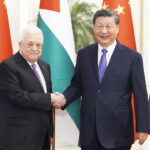Moves crucial to attract foreign capital, cope with economic downward pressure: observers
Chinese officials vowed on Wednesday to further optimize the business environment and adopt stronger measures to attract foreign investment, on the heels of initiatives announced in recent months to boost foreign trade and shore up market confidence.
Observers said that the concrete moves have sent a clear message on the Chinese government’s resolve to continuously improve the business environment, which is deemed crucial for attracting foreign investment and making investment achieve the maximum results.
Those measures could also be a prescription to cope with certain downward pressure at home and abroad, and a strong impetus to drive the growth of the world’s second-largest economy, they said.
Stronger measures will be carried out to attract foreign investment, including introducing targeted policies, reasonably reducing the negative list for foreign investment access and providing better services to facilitate foreign investment, Yuan Da, a deputy secretary-general of the National Development and Reform Commission, the top economic planner, said at a press briefing on Wednesday.
The reduction of the negative list will be carried out after assessing the effects of previous reductions and making a thorough study of the demands of localities and foreign enterprises. The authorities will also study cutting the negative list for foreign investment access at the Hainan Free Trade Port, Yuan said.
China released its catalogue of encouraged industries for foreign investment on January 1, 2023, which added 239 items, a record high. One of the focuses is to encourage foreign investment in advanced manufacturing, modern services, high tech and the green sector. Foreign investors are also encouraged to invest in China’s central, western and northeastern regions, Yuan noted.
On Wednesday, the People’s Bank of China, the country’s central bank, cut its seven-day reverse repo rate by 10 basis points to 1.90 percent, the first time in 10 months, to inject liquidity into the market.
The General Administration of Customs launched 16 initiatives on Tuesday to optimize the business environment, which will help stabilize social expectations further and boost confidence in foreign trade.
Various departments have created a market-oriented, legalized and international business environment in recent years, which provides a buttress for creating and stimulating the vitality of business entities and promoting high-quality development, Chinese officials said at the press briefing.
“A favorable business environment is crucial for attracting foreign investment and making the investment process more convenient, and optimizing the business environment can positively contribute to economic growth,” Li Changan, a professor at the Academy of China Open Economy Studies of the University of International Business and Economics, told the Global Times on Wednesday.
The main focus and challenges in improving the business environment revolve around constructing a unified large market, Li said, noting that there are obstacles such as regional divisions, inconsistent standards and non-standard regulations that hinder the establishment of a unified market, which Chinese policymakers need to scale up efforts to overcome.
As the Chinese economy has experienced an uneven recovery, where the services sector has been displaying vitality yet exports and manufacturers showed signs of softness, experts emphasized the importance of addressing weakening domestic demand and external challenges by optimizing the business environment and macroeconomic policies.
In the first four months this year, the number of newly established foreign-funded enterprises rose 31.1 percent year-on-year. The actual use of foreign capital rose 2.2 percent year-on-year to 499.5 billion yuan ($69.82 billion).
The actual use of foreign capital in manufacturing and high-tech industries jumped 4.1 percent and 12.8 percent year-on-year, which had a positive effect in optimizing the industrial structure and promoting coordinated regional development.
The robust data debunked what some Western politicians and media have been hyping as capital flight from China due to the “unpredictable environment.”
It also underscored a bullish mood among global capital, which is upbeat about China’s development, Hu Qimu, a deputy secretary-general of the digital real economies integration Forum 50, told the Global Times, while highlighting China’s numerous efforts to provide global businesses with a better business environment with the nation’s continuous high-level opening-up.
Li suggested that a next focus of the Chinese economy should lie in expanding domestic demand, which involves increasing corporate investment and stimulating consumer spending. Achieving this goal requires the implementation of more precise macroeconomic policies, such as incentivizing corporate investment, attracting foreign investment and promoting openness.
“This also calls for the enhancement of more market-friendly institutional rules and regulations to enhance overall competitiveness and attractiveness,” Li said.
(Global Times)




